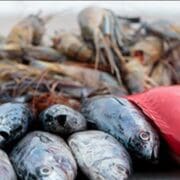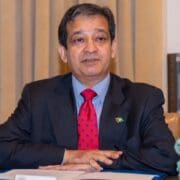Black Immigrant Daily News
The Blue Justice Caribbean Hub, a regional hub to strengthen cooperation and coordination in the use of innovation and digital technology to fight fisheries crimes, was launched on the occasion of the two-day International Blue Justice Conference 2023, which concluded Friday in UN City, Copenhagen, Denmark.
The establishment of the Blue Justice Caribbean Hub in Jamaica is the latest in a series of advancements by the Caribbean Regional Fisheries Mechanism (CRFM) and its Member States in combating illegal, unreported, and unregulated fishing and transnational organized crime in the fishing industry.
In May 2021, the CRFM Ministerial Council at its 15th Regular Meeting adopted the Resolution Regarding the Copenhagen Declaration on Transnational Organized Crime in the Global Fishing Industry and the Blue Justice Initiative.
In October 2021, 12 CRFM Member States signed the Declaration together. Several of those Ministers participated in the Blue Justice Conference 2023, during which two more CRFM Member States–Barbados and Dominica–became signatories to the international declaration.
“This climate-sensitive sector straddles the kaleidoscope of coloured economies, unfortunately including the black economy–an economy, of course, bedeviled with illegal activities such as drug and human trafficking and unregulated and unreported fishing, which have often posed a significant challenge in the sector worldwide,” said Adrian Forde, Minister of the Environment and National Beautification, Barbados, in signing the declaration.
Minister Adrian Forde – Barbados signed the Declaration remotely Photo: CRFM
Milton Haughton, CRFM Executive Director, said: “The fish stocks in our waters not only provide a significant source of food and nutrition for our people, but also contribute substantially to livelihoods, economic activities, trade, recreation, culture, and the socio-economic stability of many rural communities. However, the pillaging and plundering of our marine resources … undermine the investments and sacrifices of our governments and stakeholders to protect, manage, and use our fisheries resources sustainably, to improve food and nutrition security, eradicate poverty, and promote economic development.”
Chairman of the CRFM Ministerial Council, Parmanand Sewdien, Minister of Agriculture, Animal Husbandry & Fisheries, Suriname said: “We see that the perpetrators are increasingly making use of sophisticated technology, to carry out these nefarious activities in our waters and across our region… The Blue Justice Platform is providing insights into the movement of vessels in the region and creating a basis for greater collaboration and sharing of information.”
“We welcome and support the intention of Jamaica to function as the regional Hub,” Minister Sewdien added.
Delegates from Dominica, Grenada, Montserrat, as well as Saint Kitts and Nevis, added their public endorsement while pledging their full support to the Blue Justice Caribbean Hub during the proceedings.
Pearnel Charles Jr, Minister of Agriculture & Fisheries, Jamaica, then outlined the importance of the Blue Justice Caribbean Hub to food security, national security, and social mobility. He underscored that reducing illegal, unreported, and unregulated fishing will translate to the sustainability of fish stocks and improved livelihoods for fishers.
Minister Charles explained that although Jamaica will host the Hub, it will also identify and appoint at least one superuser on the Blue Justice Community to follow up with other registered Caribbean countries to connect under the Blue Justice Caribbean Hub. National focal points will also be identified.
Dr. Emma Witbooi, Project Manager, United Nations Development Programme (UNDP) – Blue Resilience Project, said: “The Blue Resilience Project is very proud to be supporting the establishment of regional Blue Justice Hubs globally–of which the Caribbean Hub is the first. These Hubs will essentially be nodes for developing and sustaining capacity on interagency cooperation to address fisheries crime both in the host country and between the countries of the region. The Hub will serve the specific needs identified by the countries in the region, and this is exactly what we’ve heard here today.”
Ava Whyte-Anderson – Deputy Resident Representative, UNDP Multi Country Office in Jamaica, commended the CARICOM governments for their demonstrated commitment to ending illegal, unreported, and unregulated fishing and the Caribbean’s “sizeable contribution to the achievement of SDG 14 (Life below water).”
“UNDP along with our partners are committed to providing the requisite resources at the national and regional levels to ensure the Hub reaches its full potential,” said Whyte-Anderson.
Gunnar St?lsvik, Specialist Director, Fisheries Department, Ministry of Trade, Industry and Fisheries – Norway, commended the Caribbean ministers for the passage of the Ministerial Resolution. “It shows that that region is really taking this seriously and has a clear roadmap in the implementation of this… going from words to action,” he added.
Minister Jullan Defoe – Dominica signed in Copenhagen, Denmark. Photo: Blue Justice Secretariat / UNDP
St?lsvik announced the latest signatories to the declaration: the Ivory Coast, Mauritania, Madagascar, and Barbados, which signed remotely, and Somalia, Angola, Tuvalu, Guinea, as well as the Commonwealth of Dominica, which signed at the event. He said that Thailand was also in the process of signing. H.E. Bj?rnar Selnes Skjaeran, Minister of Fisheries and Ocean Policy, Norway, said that with the new signings, the total number of signatories to the Copenhagen Declaration had surpassed 60.
“On behalf of all the members, I will–as depositor for the Copenhagen Declaration–thank you all for your strong support, and I will also thank our new members for their support,” said Minister Skjaeran as he welcomed them to the global fight and to the Blue Justice family.
Donate At Caribbean News Service, we do not charge for our content and we want to keep it that way. We are seeking support from individuals and organisations so we can continue our work & develop CNS further.
NewsAmericasNow.com











